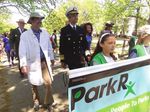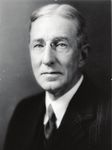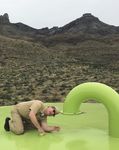One hundred years of health in US national parks
←
→
Page content transcription
If your browser does not render page correctly, please read the page content below
Theme PSF
PARKS STEWARDSHIP FORUM
Articles
NATURE AND HEALTH
EMERGING KNOWLEDGE INFORMS NEW POLICY DIRECTIONS
NOOSHIN RAZANI, MD, MPH, GUEST EDITOR
One hundred years of health
in US national parks
Diana B. Allen, National Park Service
Captain Sara B. Newman, DrPH, US Public Health Service
Corresponding author
Diana B. Allen
National Park Service
Office of Public Health/Health Promotion Branch
1849 C Street NW, Room 2541
Washington DC 20240
Diana_Allen@nps.gov
Abstract
In 2021, the US Public Health Service and the US National Park Service (NPS) celebrate a century-long
partnership (1921–2021) to protect and promote the health of park visitors, neighboring communities, and
the nation. Few know that the impetus and justification for the establishment of NPS are rooted in public
health. This paper chronicles the park service’s 100-year commitment to and experience in addressing
health protection and promotion through the years and demonstrates how public health has been intrinsic
to the purpose and values of the National Park Service from its inception up to the present day. The paper
posits a call to action to our nation’s land managers, planners, scientists, political leaders and health
officials to build on this tradition to help address some of the most complex and vexing public health
issues of the present day, such as the public health implications of a changing climate, and health inequities
impacting our nation, and to help parks realize their full potential in contributing to a healthier, happier,
more sustainable world.
Public health and public lands
It is well-known that the National Park Service Life, liberty, and pursuit of happiness are
(NPS) was established through the Organic Act in fundamentally American ideals—enshrined in
1916. What may be lesser known is that the impetus the preamble to the Declaration of Independence
and justification for the establishment of NPS and grounded in the NPS purpose and mission.
have their roots in public health. This paper shines Our nation’s first parks were established in
a light on the vital and enduring connection of the 1800s in response to the ill effects of the
parks and public health up to the present day, and Industrial Revolution. Many of these parks (Hot
major milestones marking NPS’s dedication to the Springs Reservation, 1832; Central Park, 1858;
nation’s health, including a 100-year partnership and Yellowstone National Park, 1872) were set
(1921–2021) with the United States Public Health aside as a means of protecting resources while
Service (PHS). democratizing clean air, clean water, and outdoor
PSF 37/1 | 2021 95enjoyment for the health and inspiration of all
people.
The Industrial Revolution prompted a growing
awareness of the connection between poor living
conditions and epidemic episodes caused by such
diseases as cholera, yellow fever, smallpox, typhoid
fever, and typhus fever. The rapid and unplanned
movement of populations into urban areas brought Fordyce Bath House staff, Hot Springs National Park, ca. 1915–1923. The park traces its
with it increased poverty, dismal sanitary and origins to 1832. | NATIONAL PARK SERVICE
housing conditions, and reduced exposure to the
outdoor, natural environment. These conditions
led to greater incidence and prevalence of Public discourse during this period continued to
communicable diseases and poor health. argue strongly for the distinct purpose of parks to
provide for people’s health and happiness. In 1865,
Several social movements emerged at this time, Olmsted further espoused the health benefits of
to ameliorate ill effects of urbanization including parks, this time to include the benefits of non-
the City Beautiful movement, the Playground urban parks, articulated in the Yosemite and
movement, and the Conservation movement—all Mariposa Grove Preliminary Report to Congress, in
of which came to bear on the development of which he penned these words:
parks. It was not coincidental, therefore, that the
founding figures of the national park system felt It is the main duty of government, if it is not
an urgent concern around threats to human health the sole duty of government, to provide means
and identified the need for a national system to of protection for all its citizens in the pursuit
protect the most beautiful and treasured natural of happiness against the obstacles, otherwise
open spaces in America for enjoyment and use insurmountable, which the selfishness of
of all people as a fundamental resource to help individuals or combinations of individuals
address these public health threats. is liable to interpose to that pursuit....
It is a scientific fact that the occasional
Frederick Law Olmsted Sr., chief architect contemplation of natural scenes of impressive
of New York City’s Central Park, identified character, particularly if this contemplation
urban parks as a public health antidote to the occurs in connection with relief from ordinary
overcrowding, pollution, and disease associated cares, change of air and change of habits, is
with urbanization. He aptly described Central Park favorable to the health and vigor of men and
as the “lungs of the city.” Those health credentials especially to the health and vigor ... and the
were a factor in his appointment to the United means for securing happiness.3
States Sanitary Commission as general secretary
in 1861, charged with addressing the sanitation and Olmsted’s commitment to parks and public health
health needs of the Union Army’s military camps. was carried on by his son, Frederick Law Olmsted
Under his leadership, the Sanitary Commission Jr., like his father a landscape architect who also
made recommendations on the location of Army dedicated his life’s work to the conservation and
camps, drainage and waste disposal, ventilation improvement of parks and contributed to the
of tents, and storage and preparation of food. creation of NPS by helping write the text of the
That appointment would seem to be another clear Organic Act. In a 1910 letter to Acting Secretary
demonstration of the strong link between public of the Interior Frank Pierce, the younger Olmsted
health and parks.1–2 made clear his view that in the establishment of
PSF 37/1 | 2021 96> The nation was now vested with a commitment to build a park
system to provide public health and recreational opportunities and
to preserve America’s most treasured places
parks, both public recreation and public health with those of both Olmsted Sr and Jr years prior—
are distinctly important. He advised the acting by making a distinction between the supplying
secretary that national parks be managed to recreation grounds and furthering knowledge and
promote “public recreation and public health.”4 health.
In 1915, the Department of the Interior hosted The first step in the consideration of a general
the Third National Park Conference in Berkeley, policy for the administration of the national
California, where Mark Daniels, the newly parks is the determination of just what
appointed superintendent of Yellowstone National functions they perform. Clearly, they are not
Park, stated that for the parks to be a success, “We designated solely for the purpose of supplying
are going to put them to the use for which they recreation grounds. The fostering of recreation
were set aside, in other words, if they are going purely as such is more properly the function
to bring in dividends, not only in money, but in of the city, county, and State parks, and there
health, happiness, and increased intelligence, they should be a clear distinction between the
must certainly be visited by the people.”5 character of such parks and national parks.
The latter should constitute a class that is of
In the mid-19th century, Congress had begun national interest. In the category of national
to protect lands as parks; however, it did so in parks should be no reservation that is of local
piecemeal fashion. On April 20, 1832, President interest only. What, then, are the functions
Andrew Jackson signed legislation to set aside of our national parks as distinguished from
land in Arkansas that included what is today Hot State and local parks? As I view this question
Springs National Park. Forty years later, Congress our national parks should serve three distinct
passed the Yellowstone Act of 1872, preserving a functions: The stimulation of national
vast landscape of 3,400 square miles in Wyoming patriotism. The furthering of knowledge and
and Montana “as a public park or pleasuring- health. The diverting of tourist travel to the
ground for the benefit and enjoyment of the scenic areas of the United States.”7
people.” These efforts triggered additional actions
by the federal government to set aside other areas In a 1918 letter to Mather from Secretary of
for protection and enjoyment. It was not until the Interior Franklin K. Lane, he advised that
1916, with President Woodrow Wilson’s signing the policy of the agency should be based on
of the Organic Act, that this piecemeal approach three principles: parks should be “maintained
to protecting land became unified under one in absolutely unimpaired form” for the use of
administrative system.6 current and future generations, that “the national
interest must dictate all decisions affecting public
The nation was now vested with a commitment or private enterprise in the parks,” and finally,
to build a park system to provide public health they should be “set apart for the use, observation,
and recreational opportunities and to preserve health, and pleasure of the people.”8
America’s most treasured places. Stephen Mather,
the first NPS director, communicated his view The promotion and protection role of parks
of parks as more than just places set aside for Land management leaders assigned to park units
protection and recreation, but also for promoting not only understood the public health benefits of
education and health. It is significant that these parks as a resource to restore and remedy mental
sentiments in his first annual report are aligned and physical health, they also understood the
PSF 37/1 | 2021 97> The PHS Commissioned Corps origins trace back to an act of
1798 to protect the health of sailors and immigrants
importance of ensuring that a park visit would not Hommon, who was sent to conduct sanitary
be the cause for illness or injury. With the advent surveys of Yellowstone, Yosemite, Sequoia, and
of the widely available Model-T automobile and a General Grant (now Kings Canyon) National Parks
railroad system making even faraway destinations to inspect the water supplies, sewage, and garbage
more accessible, a surge in visitation led to the disposal; provide mosquito control; and supervise
expansion of hotels and food service in parks and and inspect milk supplies and kitchen sanitation.11
also increased the need to ensure that suitable and These reports were followed by many others
safe drinking water and waste water systems would documenting the work of PHS Commissioned
not carry the risk of disease transmission. Corps officers assigned to a growing number of
parks.
The PHS Commissioned Corps
Now charged with administering a federal system The value of the officers assigned to NPS and the
of parks, land managers looked to another partnership between the National Park Service and
federal agency for support to help address the PHS was noted early on and documented in the
sanitation and disease prevention needs of the 1922 NPS Annual Report:
park system: the PHS Commissioned Corps. Its
origins trace back to an act of 1798 to protect the From this brief review of the effective work
health of sailors and immigrants, and the PHS of the Public Health Service the visitor to the
Commissioned Corps was officially created in parks may feel assured that his health is as
1889. In 1902, Congress broadened the role of PHS zealously guarded as in the town or city whence
Commissioned Corps from solely medical and he comes. Due to the constantly increasing
disease prevention to roles in scientific research, numbers of visitors to the parks from year
sanitation, water supply, and sewage disposal. to year larger demands for adequate water
supply, garbage and sewage disposal, and
As described in the NPS Annual Report of 1918 general camp sanitation are made and must
and documented in the 1918 Annual Report of the be met. With the cooperation of the Public
Surgeon General of the Public Health Service of the Health Service we know what is essential to
United States, there was a growing need to address establish a satisfactory standard of sanitation; it
public health issues in parks. In Yellowstone, for depends only on the amount of funds furnished
example, on the basis of a complaint regarding by Congress for this work how rapidly this
water contamination in the hotel in the summer standard can be attained from year to year….
of 1917, PHS sent its laboratory car “Hamilton” This work by the Public Health Service
to provide sanitary inspections of the drinking furnishes one of the outstanding examples
water and wastewater. During the following four of effective cooperative work on the part of
weeks, the PHS officers made “a careful test of one bureau of the Government with another,
all waters in the park that are used for drinking and assuredly is conducive toward the most
or culinary purposes.” In the report the officer efficient functioning of each bureau, including
noted that abnormally high water might occur and the wise expenditure of Federal moneys for the
“would be sure to highly pollute the water supply work involved.12
with Gardiner River water, unless conditions are
immediately changed at the pump house.” He In addition to the critical sanitation work the
reported that notices were posted “ordering the PHS officers did throughout the years, their role
water boiled before using it for drinking or culinary expanded to include medical services. In 1931,
purposes.”9–10 Another report in 1921 documented officers were assigned to provide hospital service
the work of PHS Sanitary Engineer Harry B. in Yellowstone, Grand Canyon, Yosemite, Crater
PSF 37/1 | 2021 98Yosemite National Park | NATIONAL PARK SERVICE / CICELY MULDOON
Lake, Sequoia, and Mesa Verde National Parks, to visitors in parks resulted in a 1921 decision
and the service of physicians and trained nurses by PHS to assign public health officers in the
were available in all the major parks. Hot Springs Commissioned Corps to support park decisions
National Park operated a free clinic in connection to protect human health. In 2021, NPS and PHS
with a government-run free bathhouse.13 Today, celebrate their 100-year commitment to public
the clinical support continues, with a PHS medical health through this partnership. Over the last 100
team at Yosemite National Park providing care to years, this commitment has served as a source of
park employees, residents, community members, pride in the accomplishment of the NPS mission
and visitors. across the decades and is evidenced in annual
reports and strategic plans, including the 50th
This dual commitment to promote parks as and 100th anniversaries of NPS leading up to the
a health resource and to mitigate disease risk present time14–19
PSF 37/1 | 2021 99The partnership between the National Park Service and the US Public Health Service was formalized in 1921 during the tenure of NPS Director Stephen T. Mather (left)
and Vice Admiral Hugh S. Cumming, the surgeon general (right). | NATIONAL PARK SERVICE; LIBRARY OF CONGRESS
The formal agreement was put in place between Looking to the next 100 years of health
NPS Director Stephen Mather and Vice Admiral As the nation throughout the years has continued
Hugh S. Cumming, the fifth US surgeon general. to add more park units to the system, now more
The intent was to provide sanitary engineers, than 420 in total and at least one in every state, the
physicians, and nurses of PHS to: scope of public health needs in parks have grown
and so, in turn, has the diversity of public health
cooperate with superintendents of the professionals required to meet these needs. NPS
national parks and custodians of the national has hired civilian health and safety professionals
monuments on all problems of sanitation and continues to assign PHS Commissioned
in parks. The work consisted of inspection Corps officers through an agreement with the
of hotels, lodges, and all other places where Department of Health and Human Services, under
operators handled or served food products or the direction of the US Surgeon General. Today,
provided lodgings; inspection of automobile nearly 60 public health officers, with expertise in
and housekeeping camp grounds and engineering; epidemiology; environmental health;
Government messes; inspection of water occupational, human, and veterinary medicine; and
supplies, sewage-treatment plants, and garbage science and health services administration, serve
incinerators; preparation of plans for water in every region across the national park system
supply systems, sewage treatment plants and to provide public health support. In 2009 that
garbage incinerators; mosquito-control work; agreement was extended to the Department of the
and miscellaneous activities pertaining to Interior and all its agencies; now there are several
sanitation.20–21 officers at the Bureau of Indian Affairs, the US Fish
PSF 37/1 | 2021 100> Even after 100 years, the focus of public health duties has not
altered greatly, with a continuing charge to help park managers
ensure food systems, drinking water, wastewater systems, and
recreational waters meet health regulatory codes
and Wildlife Service, and supporting leadership of mitigation strategies to protect park visitors from
the Department of the Interior. diseases, such as rabies, plague, tularemia, tick-
borne illnesses, norovirus, and, most recently,
Even after 100 years, the focus of public health Covid-19.
duties has not altered greatly, with a continuing
charge to help park managers ensure food To solidify its commitment to health promotion
systems, drinking water, wastewater systems, and and the role of parks as a health resource, in 2011
recreational waters meet health regulatory codes. the NPS established the Healthy Parks Healthy
Officers also provide engineering services, such as People program. It works to advance the fact that
project review and management of a multiplicity all parks —urban and wildland—are cornerstones
of park system facilities, industrial hygiene of people’s physical, mental, and spiritual health
services, a range of medical services, and wildlife and their social well-being, as well as contributing
health services. In addition, they conduct disease to the sustainability of the planet.
surveillance, investigate outbreaks, and implement
(left) US Public Health Service officer inspecting water tank at Big Bend National Park; (right) PHS officers inspecting food at Independence National Historical Park.
| NATIONAL PARK SERVICE
PSF 37/1 | 2021 101The 19th Surgeon General, Vice Admiral Vivek H. Murthy (center), and Dr. Robert Zarr, Pediatrician, Unity Health Care, Founder and
Medical Director of Park Rx America (left), lead children on a walk on the first National Park Prescriptions Day, hosted by the National
Park Service, Office of Public Health, 2016. | NATIONAL PARK SERVICE
Building on the best available science, NPS has health resource, and this notion has continued to
identified a set of Healthy Parks Healthy People be proven through mounting scientific research
promising practices on “what works for health,” over the last two decades demonstrating the
for national expansion. Examples include “doctor- myriad health benefits of human connections to
led” programs (park prescriptions, walk with nature and the outdoors. The need for parks to
a doc, art therapy); “self-led” fitness programs promote health and well-being has never been
(running, walking, fishing, camping, bicycling); more salient to the American public than today, as
and “healthy habitat” programs (green parks, quiet this nation faces the worst pandemic to strike in
parks, smoke-free parks, healthy concessions). By 100 years. Through the support and guidance of
promoting parks as a health resource, the Park the public health professionals assigned to NPS,
Service aims to bring about lasting change in the agency has been able to safely continue its
Americans’ lifestyle choices and their relationship commitment to provide resources for recreation,
with nature and the outdoors, with a vision enjoyment, and health. Even at the height of the
for parks to help create “a healthy, just, and first wave of the Covid-19 pandemic, 96% of all
sustainable world.”22–24 These programs often target outdoor spaces in the national parks were open to
populations most in need of them, such as military, the public.
veterans, youth, elderly, and populations of color,
whose access to and utilization of parks have often While these are challenging times, NPS has
been limited. been able to demonstrate a healing aspect to the
pandemic—providing beautiful, open space to
The NPS founders were resolute that parks are a heal and restore. But there is more. Through this
PSF 37/1 | 2021 102Family at Urban Kids Fishing Derby on National Mall | NATIONAL PARK SERVICE / DIANA B. ALLEN
pandemic we have seen that when there is less the forefront of all its work. These issues include
traffic, the air is cleaner, the night skies are clearer, a changing climate that will bring new tropical
and you can see the stars more vividly. Waterways diseases, and increasing prevalence of fires, floods,
lose their turbidity and become crystal clear. You and tropical storms.
can see the fish. All that is becoming more visible
in the natural world is beginning to stir in many Furthermore, access to quality parks and
of us a new consciousness that there are a few greenspace for all people can serve as a social
things we need to change in order to build back a equalizer. These special places not only help to
stronger, healthier, and more sustainable world. prevent illness and disease, they provide a remedy
And perhaps this pandemic has demonstrated that, for all people to address health inequities, and to
through sustained cooperation and commitment lead healthier, happier, more fulfilled lives. Because
to advancing and protecting the role of parks as so few people know of the rich and robust history
a health resource, we can provide these precious and capacity of NPS to address both public health
resources for generations to come. promotion and protection, the agency may be
undervalued for its critical role in addressing some
The year 2021 marks a hundred-year milestone of the most complex and vexing public health
for NPS and the country. NPS, through its issues our nation will confront over the next 100
commitment to health and with the support and years. This is a call to action, not only for our park
guidance of health professionals, has demonstrated managers and public health officials, but for the
its leadership role in addressing the most pressing scientific community to use our parks as living
health issues of our nation. These 100 years of laboratories to better understand the problems and
experience now position and call upon the agency solutions that can carry us into a healthier, happier,
to continue this public health leadership role. more sustainable future.
NPS will need to address public health issues in
PSF 37/1 | 2021 103Endnotes
1. T. Fisher, “Frederick Law Olmsted and the 276. https://www.nps.gov/parkhistory/online_
Campaign for Public Health,” Places Journal books/albright2/pdf/ch21.pdf (accessed August
(November 2010). https://placesjournal.org/ 6, 2020).
article/frederick-law-olmsted-and-the-cam- 9. National Park Service, Annual Report, 1918
paign-for-public-health/?cn-reloaded=1&cn-re- (Washington, DC: NPS, 1918), 129. https://
loaded=1 (accessed December 1, 2020). babel.hathitrust.org/cgi/pt?id=hvd.3204402938
2. National Park Service, “Olmsted and the 7669&view=1up&seq=111 (accessed August 6,
Civil War.” https://www.nps.gov/frla/learn/ 2020).
historyculture/olmsted-and-the-civil-war.htm 10. Annual Report of the Surgeon General of the
(accessed December 12, 2020). Public Health Service of the United States, 1918
3. Frederick Law Olmsted, Yosemite and the (Washington, DC: Government Printing
Mariposa Grove: A Preliminary Report (1865). Office, 1918), 87–88. http://www.archive.org/
https://www.yosemite.ca.us/library/olmsted/ details/annualreportofsu1918unit (accessed
report.html. Olmsted, “Yosemite: The Early December 5, 2020).
Years,” 18–19. https://www.yosemite.ca.us/li- 11. Annual Report of the Surgeon General of the
brary/olmsted/ (accessed December 4, 2020). Public Health Service of the United States, 1922
4. Letter from Frederick Law Olmsted Jr to (Washington, DC: Government Printing
Frank Pierce, acting secretary of the interior Office, 1922), 157–158. https://babel.hathitrust.
(December 31, 1910). Cited in Rolf Diamant, org/cgi/pt?id=hvd.hx3u7w&view=1up&se-
“The Olmsteds and the Development of the q=174&q1=national%20park%20service (ac-
National Park System.” http://www.olmsted. cessed December 5, 2020).
org/the-olmsted-legacy/the-olmsted-firm/the- 12. National Park Service, Annual Report,
olmsteds-and-the-development-of-the-nation- 1922 (Washington, DC: NPS, 1922), 26.
al-park-system (accessed February 2, 2016). https://babel.hathitrust.org/cgi/pt?id=uc1.
5. Mary Shivers Culpin, “For the Benefit and c024898857&view=1up&seq=28&q1=public%20
Enjoyment of the People”: A History of Conces- health (accessed August 6, 2020).
sion Development in Yellowstone National Park, 13. National Park Service, Annual Report,
1872–1966 (Yellowstone National Park, WY: 1931 (Washington, DC: NPS, 1931),
Yellowstone Center for Resources, 2003), 57. 143–144. https://babel.hathitrust.org/cgi/
https://www.nps.gov/yell/learn/historyculture/ pt?id=mdp.39015073324140&view=1up&se-
upload/ConcessionDevelopment.pdf (accessed q=122&q1=health (accessed December 5,
December 4, 2020). 2020).
6. Lary M. Dilsaver, ed., America’s National Park 14. National Park Service, Annual Report, 1918
System: The Critical Documents, Chapter 1: (Washington, DC: NPS, 1918), 9–11. https://
“The Early Years, 1864–1918” (Lanham, MD: babel.hathitrust.org/cgi/pt?id=hvd.3204402938
Rowman and Littlefield, 1994). https://www. 7669&view=1up&seq=20 (accessed December
nps.gov/parkhistory/online_books/anps/anps_1. 5, 2020).
htm (accessed December 4, 2020). 15. Ibid., 98.
7. National Park Service, Annual Report, 1916 16. National Park Service, Annual Report, 1920
(Washington, DC: NPS, 1916), 2 (empha- (Washington, DC: NPS, 1920), 13–14. Ac-
sis added). https://babel.hathitrust.org/cgi/ cessed http://npshistory.com/publications/
pt?id=mdp.39015006870813&view=1up&seq=11 annual_reports/director/1920.pdf (accessed
(accessed August 6, 2020). August 6, 2020).
8. Horace M. Albright, Creating the National 17. National Park Service, Annual Report,
Park Service: The Missing Years, Chapter 21: 1952 (Washington, DC: NPS, 1952), 352.
“A Creed for the Park Service, 1918” (Nor- https://babel.hathitrust.org/cgi/pt?id=uc1.
man: University of Oklahoma Press, 1999), c021000405&view=1up&seq=92&q1=nature%20
PSF 37/1 | 2021 104for%20refreshment (accessed December 3, 1931), 143. Accessed on 05 December 2020
2020). at: https://babel.hathitrust.org/cgi/pt?id=uc1.
18. Memorandum, secretary of the interior to b3807261&view=1up&seq=463&q1=sanitation
director, National Park Service, “Manage- 22. National Park Service, Healthy Parks Healthy
ment of the National Park System” (“Secre- People 2018–2023 Strategic Plan (Washington,
tary Udall’s Letter on National Park Manage- DC: National Park Service, 2018), 1. Accessed
ment”), July 10, 1964. https://www.nps.gov/ on line on 05 December 2020 at: https://
parkhistory/online_books/anps/anps_6a.htm www.nps.gov/subjects/healthandsafety/upload/
(accessed August 6, 2020). HP2-Strat-Plan-Release-June_2018.pdf
19. National Park Service, A Call to Action: 23. National Park Service, The National Parks
Preparing for a Second Century of Steward- and Public Health: A NPS Healthy Parks,
ship and Engagement (Washington, DC: NPS, Healthy People Science Plan (Washington,
2016), 11. https://www.nps.gov/calltoaction/ DC: National Park Service, 2013). https://
PDF/C2A_2015.pdf (accessed August 6, 2020). www.nps.gov/subjects/healthandsafety/upload/
20. National Park Service, Annual Report of the HPHP_Science-Plan_2013_final.pdf (accessed
Director 1930 (Washington, DC: NPS, 1930), December 5, 2020).
198. https://babel.hathitrust.org/cgi/pt?id=coo.3 24. National Park Service, “Healthy Parks
1924071804110&view=1up&seq=159&q1=health Healthy People” (webpage). https://www.nps.
(accessed August 4, 2020). gov/subjects/healthandsafety/health-benefits-
21. National Park Service, Annual Report of of-parks.htm (accessed December 5, 2020).
the Director 1931 (Washington, DC: NPS,
PSF 37/1 | 2021 105The Interdisciplinary Journal of Place-based Conservation
Co-published by the Institute for Parks, People, and
PSF
Biodiversity, University of California, Berkeley and
the George Wright Society. ISSN 2688-187X
PARKS STEWARDSHIP FORUM
Citation for this article
Allen, Diana B., and Capt. Sara B. Newman. 2021. One hundred years of health in US national parks. Parks
Stewardship Forum 37(1): 95–105.
Parks Stewardship Forum explores innovative
thinking and offers enduring perspectives on critical
issues of place-based heritage management and
stewardship. Interdisciplinary in nature, the journal
gathers insights from all fields related to parks,
protected areas, cultural sites, and other place-based
forms of conservation. The scope of the journal is
international. It is dedicated to the legacy of George
Meléndez Wright, a graduate of UC Berkeley and
pioneer in conservation of national parks.
Parks Stewardship Forum is published online at
https://escholarship.org/uc/psf through
eScholarship, an open-access publishing platform
subsidized by the University of California and
managed by the California Digital Library. Open-
access publishing serves the missions of the IPPB
and GWS to share, freely and broadly, research
and knowledge produced by and for those who
manage parks, protected areas, and cultural
sites throughout the world. A version of Parks
Stewardship Forum designed for online reading is
also available at https://parks.berkeley.edu/psf.
Parks Stewardship Forum is distributed under a
Creative Commons Attribution-NonCommercial On the cover of this issue
4.0 International License (CC BY-NC 4.0). Family exploring tidepools at Cabrillo National Monument,
California. | GEDAPIX
The journal continues The George Wright Forum,
published 1981–2018 by the George Wright Society.
The entire issue is available at
Designed by Laurie Frasier • lauriefrasier.com https://escholarship.org/uc/psf.You can also read


























































